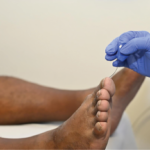Dr. Hellmich stated that new data on avacopan prompted EULAR to recommend its use in combination with rituximab or cyclophosphamide for induction of remission in GPA or MPA to reduce exposure to glucocorticoids.
In another revision, rituximab is recommended as the first-line treatment for maintenance of remission in patients with GPA or MPA, with methotrexate and azathioprine as alternatives. In addition, to maintain remission, treatment should be continued for at least 24–48 months for patients with new-onset disease, and longer duration can be considered for patients with relapsing disease or risk factors for relapse.
EGPA
Dr. Hellmich explained that eosinophilic GPA (EGPA) now has several of its own recommendations rather than being grouped with GPA and MPA. Mepolizumab has been of interest for the treatment of patients with EGPA since a landmark study in 2017 on this subject.2 It is indicated for induction of remission and for maintenance of remission in patients with relapsing or refractory EGPA without organ- or life-threatening disease.
Altogether, the revised and new recommendations for the management of AAV recognize distinctions between various forms of vasculitis and incorporate the most relevant data from important studies in recent years.
Axial Spondyloarthritis
Sofia Ramiro, MD, MSc, PhD, consultant rheumatologist and senior researcher, Leiden University Medical Center and Zuyderland Medical Center, the Netherlands, next provided an overview of the 2022 Assessment of SpondyloArthritis international Society (ASAS)/EULAR recommendations for the management of axial spondyloarthritis.
The algorithm used in the recommendations begins with ensuring the patient has a clinical diagnosis of axSpA, noted Dr. Ramiro. This may seem self-evident, but she notes that it is important not to diagnose patients based on classification criteria for disease because these are intended for research purposes and do not translate in all cases to correct clinical diagnoses in real-world practice. Another overarching principle is that in all patients with axSpA education on the disease, regular exercise, physiotherapy and smoking cessation should be at least considered as aspects of treatment.
For all patients with axSpA, EULAR recommends a trial of at least two non-steroidal anti-inflammatory drugs over a total of four weeks, and patients with predominant peripheral manifestations should be given at least one local steroid injection, if appropriate. A therapeutic trial of sulfasalazine is also recommended for these patients.
Dr. Ramiro explained that for patients who require escalation to a biologic or targeted synthetic disease-modifying anti-rheumatic drug (DMARD), agents may include tumor necrosis factor-α (TNFα) inhibitors, interleukin (IL) 17 inhibitors or Janus kinase (JAK) inhibitors. In clinical practice, however, more data exist on the use of TNFα inhibitors and IL-17 inhibitors in patients with axSpA, so these treatments are more commonly used than JAK inhibitor therapy.



